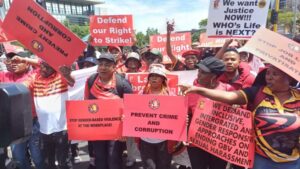Dozens of dismissed law enforcement officers demonstrated outside the Civic Centre in Cape Town on Wednesday to demand their reinstatement.
Led by the South African Municipal Workers Union (Samwu), the workers carried placards that read: “City is anti-workers”, and “City must comply with its policy” as they sang struggle songs. Hlalanathi Gagayi, the regional organiser of the union said the city fired the officers after assessing their abilities to drive and use firearms.
The contracts of the 66 LEAP (Law Enforcement Advancement Plan) officers were terminated “due to non-compliance with the operational requirements of their contracts, including that they be in possession of a valid driver’s licence and be competent in handling firearms,” according to the City of Cape Town.
“All of them passed their driver’s license tests a few years ago, but they never drove cars again afterwards. Having a driver’s license doesn’t mean you are a fully-fledged driver,” said Gagayi. He said the city just assessed their driving skills without teaching them how to drive. They were also disadvantaged in the test of firearm competence, he said, as the officers had to shoot an A4 sheet of paper whereas they had been targeting an A3 during their training. Moreover, he added, they had to finish the shooting test within a time limit, unlike during their training. “We say the city must train them at the same level they will be tested at,” said Gagayi.
He said Samwu want the city to give the officers more time to acquire skills and “not treat them as if they will never be competent”. “We say the city must follow its policy and dismiss the officers as a last resort.”
Malvern de Bruyn, provincial secretary of Cosatu, said he joined the protest to support the officers. “The city dismissed 66 officers. Out of that number, 60 are black female officers. Next month more officers will be dismissed,” he said. According to him, the city intends to fire 275 officers in total. “We want those officers to fight crime in our communities,” he said.
Western Cape Community Safety department says the Law Enforcement Advancement Plan (LEAP) officers ensured greater visibility in various hotspot areas where they are deployed. Photo supplied.
A Khayelitsha-based officer, who asked not to be named for fear of victimisation, said the city should have assessed the candidates’ driving skills before hiring the officers. “We were invited for a written assessment. If you pass, you undergo a physical assessment, an interview and a drug test,” she said. “We went to the college after the interview. There was no driving assessment before we got hired. It was introduced while we were already employed. We are no longer trainees.”
The LEAP officers could not meet the requirements for firearm competency either, she said, because they were not trained adequately. “We were trained to use a firearm for only five days. We dealt with theory for two days and dealt with the practical use of firearms for only two days. On the fifth day we were just assessed,” said the Khayelitsha officer. “You can’t train people who have never touched a firearm to use it for only two days and expect them to use it competently.” The memorandum submitted by the protesters demands that the city recognise its responsibility to the officers for training in the use of firearms.
She now fears that the bank will repossess her car because she has no money to pay the monthly instalment. “Because of the dismissal, I don’t have money to hire transport to take my kid to school and buy food for my mother,” she said. A Gugulethu-based officer, who signed a three-year contract in 2020, said: “I’m sick because of stress. I don’t know how I will support my family.”
The memorandum further demands that the city complies with its fleet management procedures. It calls upon the city to recognise that people from disadvantaged backgrounds last drove cars on the day their driving skills were tested at municipal testing centres, and be sympathetic.
Luthando Tyhalibongo, spokesperson for the city, said: “The city followed due process prior to the termination of service of the former staff members. Samwu is entitled to approach the South African Local Bargaining Council [SALGBC], should it hold a view that the terminations were unlawful or unfair,” he said.





